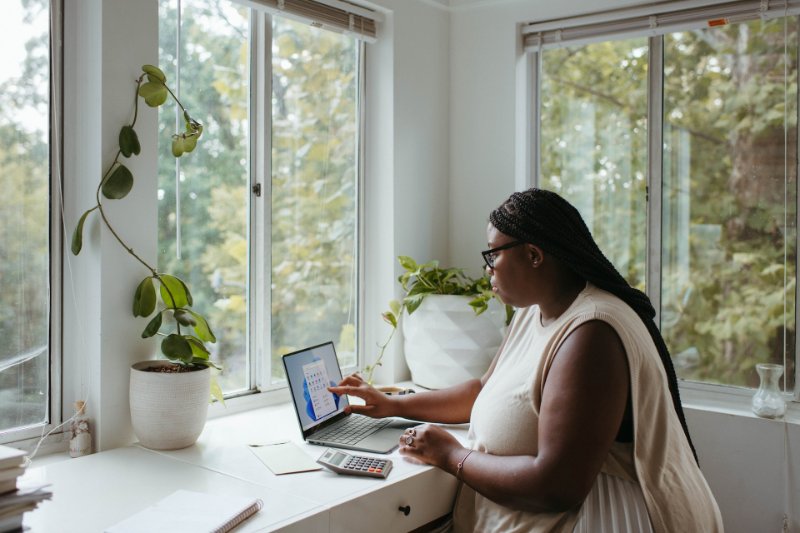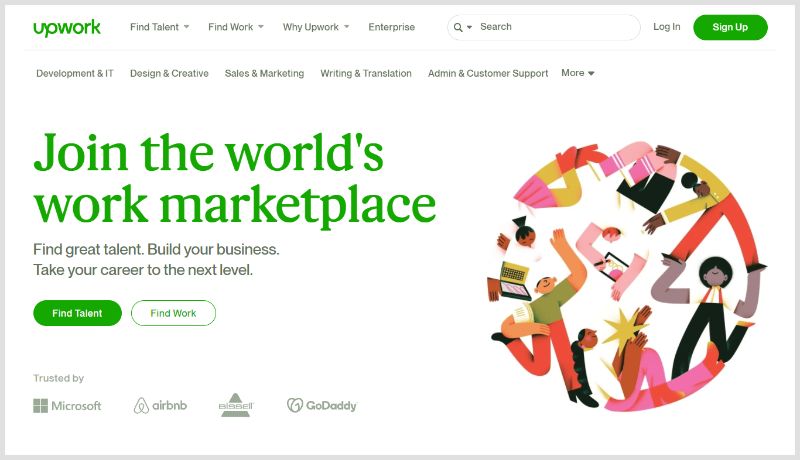
What is freelance work, and how exactly can one become a freelancer? Here’s a comprehensive guide to help you get started.
Freelancing started out as a trend – a second-rate replacement for grueling 9 to 5 office jobs. Workers looking for more control and freedom over their professional life basked in the comforts of working on a per-job basis but never with full-fledged commitment.
After all, why would anyone commit to the freelance way of life in exchange for the security a full-time job offers?
Today, with the massive workforce shift to the gig economy, freelancing is here to stay. The rise of freelance platforms like TaskRabbit, Upwork, Fiverr, and Toptal is largely to blame.
As more and more companies find value in hiring freelancers, the number of gig workers has grown exponentially to keep up with the demand.
Statistics paint a clear picture of the ongoing shift in our workforce: there are 6 million more U.S. gig workers in 2020 than a decade prior. Statista, a popular business data platform, said that the freelance community will most likely increase to over 86 million by 2028.
These are impressive findings – one that should encourage you to prepare yourself to freelance, and freelance well. But how exactly should you go about it? Is freelancing worth the investment? What is freelance work and why is freelancing important?
We’ve gathered everything you need to know to gain a better understanding of freelance businesses with tips on how to get started. Ready to be your own boss? Read on below.

Freelance meaning: a self-employed individual who takes on various projects with one or more clients.
To define freelancing, we need to dive into the history of freelancing. Gigs began in the middle ages, and medieval mercenaries who offered their services to the highest bidder were called freelancers.
Freelance definition later evolved from its origins in the military scene to the business world, where it is often used to describe a self-employed person who works on several jobs for multiple clients.

Freelance job meaning: any job that is undertaken by an individual who works for themselves, rather than a company.
Because of this freedom, it’s normal for freelancers to handle multiple jobs from multiple clients at the same time, although some freelance contracts may restrict the worker from taking on other work until they complete the project.
Freelancers should be differentiated from sole traders – a specific business structure registered with HMRC. The term freelancing is not a legal status, instead, it pertains to the type of work being offered.
While some freelancers can be sole traders and vice versa, they are not mutually exclusive. Sole trading is the most popular structure for freelancers, but freelancers may also choose to register as a partnership or a limited company instead.
As self-employed individuals, freelancers are often responsible for things that traditional employees are not. This includes billing clients, setting work hours, time tracking, and paying their own taxes. Freelancers are not employees of the companies they work for, instead, they are “contractors.”

Workers mulling over a shift in careers often have one common question: “What is freelance work?” Independent contractors can offer their services as a freelancer, no matter what skills they provide.
Most services provided to another business may be freelanced – all it takes is a little know-how and great self-management. We’ve listed some of the most common jobs on freelance sites below, but really, you’ll see almost every type of job in all industries on freelance platforms.
You’ll notice that most freelance jobs offered are hybrid positions – roles that blend creativity with technology or mathematics. These are roles that today’s creative workers have learned to master as technology advanced.

With the freelance market growing every day, the challenge is being competitive. To set yourself apart from the crowd, you need to prepare accordingly. So what is freelance work and how do you get started? Check out the tips below.

While anyone can freelance, the freelance lifestyle favors a certain mindset. Those who are reliable and disciplined are better at being their own bosses.
Freelancers need to be able to set a daily work routine with the capacity of juggling several projects at once. You’ll need time tracking apps to stay efficient and manage your time for clients.
Not only that, but since freelancers accept temporary stints, they must also be able to set aside time to look for new projects and gain a steady flow of work.

Some people working full-time jobs wonder if they should give up everything at the drop of a hat to immediately start freelance work. While there are those who can pull this off, a majority will find it impractical.
We advise full-time workers with financial constraints to combine full-time work with freelancing until they’ve built a solid pool of clients and a steady stream of income.

First-time freelancers often ask themselves, “What is freelance work and where do I find them?” A majority of today’s freelancers rely on freelancing sites to find projects.
While you’ll find gigs on social media channels, freelance platforms are still the best job source, as they allow workers to connect effortlessly with clients.
Most freelance sites have policies that protect both clients and freelancers, including payment protection, dispute assistance, and 24/7 support.
For freelance success, it’s integral to select the platform that best fits your salary expectations and needs.
Upwork is a freelancing site for professionals with long-term contract options and a focus on marketing and software.
Guru is cost-effective and offers flexible payment rates and helpful feedback scores.
Toptal offers exclusivity with rigorous screening and hiring only the top 3% freelancer hires. See if you can sign up for TopTal here.
Then, there is one of our personal favorites of SolidGigs that helps you find freelance jobs direct from companies.
It’s essential to study each platform to find out if their features are in line with your goals.
Check out our list of all the freelance platforms out there.
See Related: How to Get Freelance Clients

Most freelance sites come with predesigned profile templates that you may conveniently fill to display all your credentials, so they won’t require you to submit a traditional resume or CV.
Take time to create a profile that will attract potential clients, paying close attention to tailoring your skills, education, experience, and expertise to the jobs you want to apply for.
See Related: Best Time Tracking Apps for Freelancers

Putting together a solid portfolio increases your credibility and builds trust. This is also a great way to set your skills apart from other freelancers who have the same skillset.
If you specialize in hotel digital marketing that would be a lot different than a person that works solely with email marketing for software companies. So, you need to convey the right message upfront to build trust and credibility.
Here’s how to build your portfolio.
Experienced workers
Experienced workers already have an extensive assemblage of work to showcase. A great portfolio is one that best illustrates your experience and skills. If you have a vast library of work, make sure to shortlist your entries to only your best (clients do not like wading through piles of work).
While some sites allow you to upload your portfolios, others will only allow you to link them. Think about setting up your own portfolio website to better showcase your work.
First-time and beginner freelancers
We advise first-time freelancers to take some time building their portfolio first with samples of their works or accept various jobs at a discounted rate just to rack up experience.
You’ll find that it’s hard to land a project on some freelance platforms without a solid portfolio, especially those with a high barrier of entry.
See Related: How Much is $45,000 Per Year Hourly?

While your rate heavily depends on your experience and skill set, don’t sell yourself short. Working for peanuts not only devalues freelancers but also affects the quality of your work (it’s easy to offer half-baked output when you’re not getting paid right).
Here are ways how to set your rate as a freelancer. If you’re looking forward to turning to freelance as your main income generator, your rate should be able to cover your monthly expenses regardless of your experience.
See Related: Toptal Freelance Rates: Know Your Worth When Bidding

What is freelance work and how do you sign up for one? Here are a few tips on how to score the most jobs.
Apply only to jobs you’re confident to do
Before taking on a project, it’s integral to be absolutely sure that you can complete the project requirements within the specified deadline.
This means double-checking if your skills are aligned with the project’s goals and that your schedule permits the project’s timely completion.
Tailor your cover letter
Most freelance sites will require you to draft a cover letter with each application.
Make sure to specify why you’re the best candidate for the job while highlighting skills and experience that are relevant to the requirements.
Perform well
Most freelancing platforms reward freelancers with badges that give them access to various perks like lower fees or special job offers.
The better your performance is, the higher the chance you’ll acquire these badges.
See Related: Best Tax Software for Freelancers
Check out other platforms
Some freelancers deliberately avoid sourcing work from freelance platforms because the fees may build up (most freelance sites take 5% to 20% of your total earnings).
If you want to avoid these fees, you may want to look for freelance jobs on LinkedIn or Facebook, where you can join various freelance groups.
However, you must be wary about accepting projects outside of freelance platforms, where you won’t be protected by payment protection or dispute resolution.
See Related: How Much is $45,000 Per Year Hourly?

What is freelance work and what are the things to consider before taking the plunge? There are pros and cons to freelancing, but the pros always outweigh the cons.
Before signing up for your first project, it’s good to know both the advantages and the drawbacks.
See Related: How to Register as a Freelancer
Freelancing allows you to work when you want to and as much as you want to, mainly because you get to pick projects that coincide with your available schedule.
It doesn’t matter if you’re an early bird or a night owl – there are projects for every type of schedule. This allows you to make the most out of your peak productivity.
Some freelance sites post hundreds of job postings every hour, which gives you the freedom to choose a project that best suits your skills and schedule.
While you won’t be hired for each one, you’ll find greater chances of landing a job.
Working in different fields with various clients allows you to learn more and amass experience. You won’t be able to get this type of learning within the four walls of a traditional office.
Good freelancers are great self-managers who can motivate themselves. While some people are motivated to work in the presence of authority, freelancing means you need to be your own boss.
No one will keep you in check, motivate you, or make sure you meet that deadline. Self-discipline is the key to freelance success.
In rare cases, keeping up with your bills and maintaining a steady income means taking on clients that will require you to work outside of your normal working hours.
Some freelancers even work longer hours than regular full-time jobs.
Freelancing doesn’t offer you the job security of a full-time job. Since most freelance projects aren’t long-term, you’re on a never-ending hunt for new clients to cover your monthly income.
However, with good planning and foresight, this shouldn’t be a problem.
See Related: 14 Best Freelance Business Ideas
First-time freelancers may find it hard to land their first job due to competition between more experienced freelancers. The waiting time depends on your freelance platform, but freelancers mostly land their first project between three weeks to a month.
Last updated: September 1, 2023